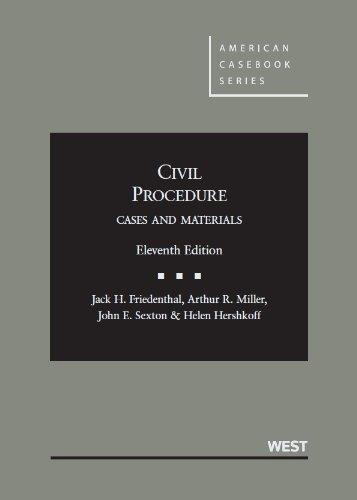11. In IN RE: MF GLOBAL HOLDINGS LTD. INVESTMENT LITIGATION, 857 F.Supp.2d 1378, 138081 (Jud.Pan.Mult.Lit. 2012), defendants...
Question:
11. In IN RE: MF GLOBAL HOLDINGS LTD. INVESTMENT LITIGATION, 857 F.Supp.2d 1378, 1380–81 (Jud.Pan.Mult.Lit. 2012), defendants in three actions and twelve
“tag-along” actions, pending in four districts, moved for centralization. The actions all followed in the wake of a holding company’s filing for bankruptcy after announcing a shortfall of an estimated $1.6 billion in commodities futures customer accounts. The Judicial Panel on Multidistrict Litigation held that transfer under 28 U.S.C. § 1407 was appropriate even though the various actions involved multiple claims based on different legal theories:
The primary dispute in this litigation is whether actions brought by securities plaintiffs should be centralized with actions brought by commodities futures customers in the same MDL. Plaintiffs opposing centralization of all actions together argue that claims under securities laws are separate and distinct from customer claims brought pursuant to the Commodities Exchange Act, 7 U.S.C. § 1, et seq.and related claims. They argue, inter alia, that centralization of both types of claims will be inefficient and inevitably slow the progress of the customer actions. We are not persuaded that the differences between these two types of claims weigh against centralizing all actions in a single proceeding. This is primarily because all actions arise from the common factual backdrop of the demise of MF Global Holdings, Ltd., and related entities and the reported shortfall in MF Global, Inc., commodities futures customer accounts. All actions can be expected to focus on a significant number of common events, defendants, and witnesses. Where actions share factual questions, the Panel has long held that the presence of disparate legal theories is no reason to deny transfer. * * * [O]ur longstanding practice has been to leave the degree of coordination or consolidation of the different actions to the sound discretion of the transferee judge.* * * We see no reason to depart from this practice in these circumstances.
The Multidistrict Panel underscored that centralization would promote efficiency. Why do you suppose some plaintiffs opposed the transfer? For some parties, won’t transfer potentially increase administrative costs, decrease attorney control, and reduce attorney’s fees? Did the Panel seriously consider these disparate effects? See Burch, Financiers as Monitors in Aggregate Litigation, 87 N.Y.U. L. Rev. 1273, 1288–91 (2012).
Step by Step Answer:

Civil Procedure Cases And Materials
ISBN: 9780314280169
11th Edition
Authors: Jack Friedenthal, Arthur Miller, John Sexton, Helen Hershkoff






